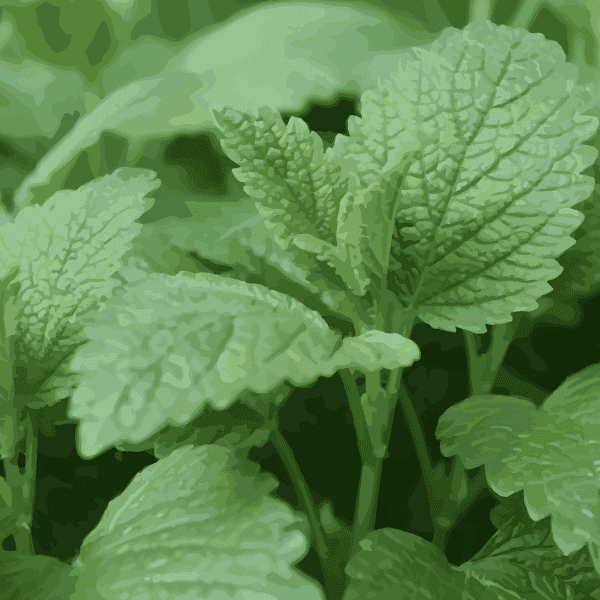
Lemon Balm {Organic}
Lemon Balm, also known as Melissa Officinalis, is an aromatic herb prized for its calming and medicinal qualities. It is often used in herbal teas and aromatherapy for its soothing effects on anxiety and stress. Lemon Balm is also known to promote relaxation and improve sleep quality, making it a popular choice for natural wellness remedies.
Lemon balm, also known as Balm, Bee balm, Cure-all, Dropsy plant, Honey plant, Melissa, Melissa folium, Sweet balm, Sweet Mary, or its botanical name Melissa officinalis, is a member of the mint family. This beautiful, bushy, herbaceous perennial is lemon-scented with wrinkled, oval-shaped, medium-green leaves. The leaves are 3 inches long with stems approximately 2 inches long. It is native to southern Europe .
You might need Lemon balm if . . .
- You often feel stressed or anxious
- You have trouble sleeping
- You experience digestive discomfort
Benefits of Lemon balm
- Promotes healthy stress response
- Promotes calmness
- Promotes restful sleep
- May relieve indigestion & nausea
Common ways to use lemon balm
You can find lemon balm in dried bulk, pills, powders, teas, extracts, or tinctures. Growing
🌿Try making herbal extractions like this stress reliever tea. ← 🟩 DIYs, recipes, and more!
Growing and Foraging Information
Lemon balm is a perennial in the mint family that thrives in well-drained soil with moderate fertility and prefers partial shade, but will tolerate full sun with adequate moisture. It loves to spread so only plant it somewhere you wont mind if it takes over or keep it in containers. When foraging, look for its bright green aromatic leaves with a lemony scent, and square stem. It is typically found in gardens or wild areas. Harvest leaves just before the plant flowers for the best flavor and most medicinal properties.
Safety Concerns
Drug Interaction: Lemon balm is regarded as a very safe herb for all. If you have any health concerns or are taking any prescription medication, please consult with your healthcare provider before adding new herbs to your diet.
Breastfeeding and Pregnancy: Herbalist Richard Whelan concludes that no adverse effects are expected from lemon balm, even in high or frequent doses. It may be confidently taken during pregnancy or while breastfeeding (there may be a mild relaxing effect on the baby as the essential oil of Lemon Balm will pass through the breast milk), and it can be used by the young or old with safety!
Other Concerns: The mainstream cautions that lemon balm may be problematic for individuals with low thyroid function. As per trusted herbalist Richard Whelan, due to lemon balm’s use for overactive thyroid conditions, there are concerns that it might be contraindicated for people with low thyroid function. In vitro, constituents of lemon balm extract have been shown to bind to TSH (thyroid-stimulating hormone). In animals, lemon balm extract has been shown to decrease levels of circulating thyroid-stimulating hormone.
Select Studies About Lemon balm
A review of clinical trials found that lemon balm can significantly reduce anxiety and depression symptoms compared to a placebo, with minimal side effects. However, due to differences between studies, more research is needed to confirm its effectiveness.
Lemon balm, known as a calming herb, helps everything from anxiety to indigestion. It’s a perennial member of the mint family, its leaves having a light lemon fragrance.